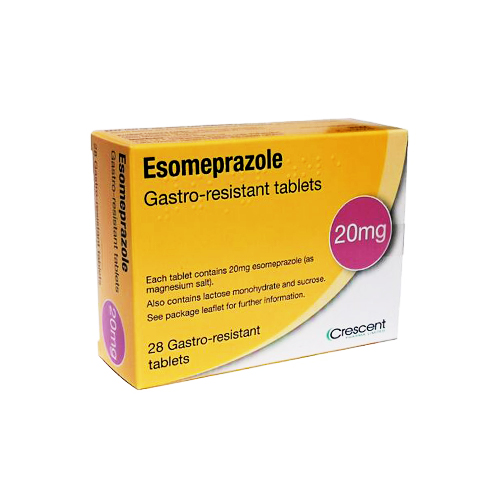- Relieves heartburn & reflex
- Relieves stomach discomfort
- Relives and prevents pain
Esomeprazole
Esomeprazole tablets are a proton pump inhibitor. Works by reducing the amount of acid that your stomach makes.
What is Esomeprazole?
Esomeprazole belongs to a class of medications known as proton pump inhibitors or PPIs. They work by reducing the amount of acid that your stomach makes. This in turn reduces the pain or discomfort in your chest or stomach and allows your body to heal any inflammation in your stomach lining.
It is used to treat heartburn, acid reflux and gastro-oesophageal reflux disease (GORD). It’s also taken to prevent and treat stomach ulcers.
Esomeprazole is also taken for a rare illness condition called Zollinger-Ellison syndrome, this is due to a pancreatic tumour.
Esomeprazole is available as capsules, tablets, granules and as a liquid.
What can I do to help with my acid reflux symptoms?
It is common for people to get heartburn and indigestion from time to time. You may find the following measurements can help reduce symptoms occurrence:
- Eat smaller and more frequent meals
- Avoid eating three to four hours before lying down or going to bed
- Keep to a healthy weight
- Stop smoking
- Avoid fizzy drinks
- Avoid foods that give symptoms e.g. coffee, chocolate, alcohol, tomatoes, and fatty or spicy food
- Avoid anti-inflammatory painkillers e.g. ibuprofen
- Reduce stress by learning relaxation techniques
- Avoid tight belts or clothing
- Raise the head of your bed by about 4-8 inches using blocks under the legs of the bed Over-the-counter medicines called ‘alginates’ or ‘antacids’ can be helpful in relieving heartburn and indigestion
Always check with your pharmacist or doctor to make sure it is suitable for you.
How does it work?
Esomeprazole is a proton pump inhibitor (PPI). It works by decreasing the amount of acid (acid secretion) in the stomach. All PPI’s e.g. Omeprazole, Lansoprazole and Esomeprazole have the same mechanism of action. It is used in gastro-oesophageal reflux disease (GORD), ulcers in the stomach or upper part of the gut caused by the bacteria Helicobacter pylori, stomach ulcers caused by certain medicines such as NSAIDs, as well as too much acid in the stomach caused by other conditions.
It is available in gastro-resistant tablet formulations of 20mg or 40mg.
Is Esomeprazole suitable for me?
Esomeprazole can be taken by adults.
Esomeprazole isn’t suitable for some people. Consult your doctor if the following applies:
- You have had an allergic reaction to esomeprazole or any other medicines in the past
- You have liver problems
- You cannot absorb certain types of sugars including glucose or sucrose
- You are due to have an endoscopy
Treatment details
What dose should I choose?
Esomeprazole is available in 20mg and 40mg tablets. Your treatment dose is dependent on the severity of your symptoms. The treatment duration will take into consideration your severity, your age and any other existing medical conditions such as liver disease. The doctor or your prescribing Health Care Professional will decide the correct dose and amount that you should take.
Esomeprazole is used in adults and children aged 12 years and over. Our service only provides Esomeprazole treatment for adults.
The tablets can be taken with or without food but should be swallowed with a full glass of water.
Doses may vary depending on other patient-related factors. It is essential to follow the instructions given by the doctor and pharmacist.
Gastro-Oesophageal Reflux Disease (GORD):
If you are suffering from acid reflux and there is evidence of irritation of the food -pipe (oesophagus), a higher dose may be used. One 40mg tablet of Esomeprazole should be taken once a day for up to four weeks. If the symptoms are not well controlled, this can be repeated for a further four weeks.
Once there is satisfactory symptom relief, this phase reflects significant healing of irritation/ulcers of the lower oesophagus (food pipe), at this stage, it is appropriate to reduce the dosage to 20mg a day.
Helicobacter pylori:
Triple therapy is the recommended treatment regime to treat Helicobacter pylori infections (H.pylori). Along with the two antibiotics, 20mg Esomeprazole is recommended TWICE daily for one week.
Stomach and duodenal ulcers caused by NSAIDS:
Esomeprazole 20mg once a day for up to 8 weeks is recommended to treat stomach or duodenal (small bowel) ulcers (peptic ulcers) caused by long term treatment with NSAID pain killers.
The duration of treatment is determined by your doctor, the ability to stop NSAID treatment is a significant factor to consider when the treatment can be stopped.
Zollinger-Ellison syndrome (excess stomach acid caused by tumour growth in the pancreas:
For the treatment of Zollinger-Ellison syndrome, the recommended dose is 40mg Esomeprazole twice a day. This is determined by your doctor who may seek advice from a specialist in this condition (gastroenterologist). The maximum dose is 80mg twice a day.
How long do I take Esomeprazole to notice benefits?
This is dependent on which condition you are being treated for. Factors such as how long the symptoms have existed, concomitant medications and co-morbidities (other pre-existing illnesses) will all have an impact. For simple gastro-oesophageal reflux, the relief is very quick.
Depending on the damage made by acid before treatment was started, and also on concurrent medication taken, the difference may be felt sooner as well as later. This will vary from patient to patient.
Important information
Pain and discomfort of heart attacks (myocardial infarctions) can resemble that of acid reflux (heartburn).
It is extremely important for you to seek urgent medical attention (call 999) if chest pain spreads to the jaws or shoulders, accompanies a racing heart (palpitations) and light-headedness.
Urgent but not emergency medical attention should also be sought if you notice any of the following:
- Difficulty swallowing (food sticking in the throat)
- Weight loss with no explanation
- Passing of dark blood-stained stools
Who can take Esomeprazole?
Esomeprazole can be taken by adults.
When shouldn’t I take esomeprazole?
Esomeprazole should not be taken if you have an allergy to any of its ingredients (please see patient information leaflet) or to other proton pump inhibitors (PPI’s; Lansoprazole, Omeprazole, Losec). Patients should not take it if they are on Nelfinavir (a treatment for HIV).
Your doctor should prescribe with extreme caution if you suffer from severe liver or kidney problems.
Please inform your doctor if you are due to have a blood test for Chromogranin A and are due for endoscopy. In such cases, Esomeprazole may interfere with the tests.
Always inform your doctor about any over the counter (OTC) or prescription medicines that you are taking before this medication is prescribed.
How to use Esomeprazole
It’s usual to take Esomeprazole once a day (twice a day treatment for only certain conditions-see above), It is best to take it first thing in the morning with a full glass of water. It can be taken with or without food.
If you have problems swallowing tablets, please contact your doctor or pharmacist for further advice, an alternative may be recommended.
Simple steps
Simple lifestyle changes can help to manage the symptoms of heartburn effectively in most people. Measures such as dietary modifications and lifestyle changes are extremely useful. Mild treatment options such as antacids can be added on if lifestyle alone is not helpful
Esomeprazole 20mg tablets four weeks. If your symptoms do not resolve, your doctor may consider prescribing for a further four weeks.
In most cases, a short course treatment is sufficient, if the symptoms return after a few months, your doctor can prescribe you Esomeprazole for another course. Occasionally some people require this treatment long term.
Treatment dosage:
- heartburn and acid reflux: 20mg once a day
- gastro-oesophageal reflux disease (GORD): 20mg to 40mg once a day
- stomach (peptic) ulcers: 20mg once a day
Will my dose go up or down?
This depends on what you are taking this medication for. Occasionally the dose will need to be increased if the lower dose is not achieving symptom control. The reverse is also true, you may start off at a high dose for a short course and reduce to a lower maintenance dose.
How long will I take it for?
If you have not seen any benefit from Esopemrazole after taking it for two weeks, please consult your doctor, your doctor may either recommend you increase your dose or go for some tests to identify what the cause of your symptoms is.
Some patients take Esomeprazole only when they have symptoms, this means you only take it when you are feeling the symptoms of acid reflux. This is not suitable for everyone as some patients symptoms return with far more severity.
What if I forget to take it?
If it is within the same day, take the missed dose as soon as you remember. Do not take a double dose to make up for a missed dose.
What if I take too much?
This medication shows a broad safety profile, unless you suffer from liver or kidney problems one or two extra doses are unlikely to cause any problems. However, be mindful of the following symptoms and inform your doctor if you notice these after an extra dose:
- Extra sweaty
- Fast heartbeat
- Sleepy
- Agitated
- Blurred vision
What happens if I stop my Esomeprazole?
If you take Esomeprazole for more than a few weeks, your stomach may temporarily increase its ability to make acid (reduced stomach acid secretion). If you abruptly stop the PPI, acid levels are now higher than before you started the therapy. Your symptoms may be worse than they were previously (rebound symptoms). Rebound symptoms can last up to two weeks. It is far better to taper down PPI therapy slowly.
Certain conditions require lifelong PPI treatment such as Barrett’s Oesophagus, therefore it is important to discuss with your doctor before ceasing treatment.
Options for stepping down treatment (tapering)
If you are suitable for stepping down or stepping off treatment, your doctor will discuss with you which approach would suit you best:
“Take when needed” treatment. You only take a PPI occasionally when you have symptoms.
Short courses of treatment If your symptoms return, a short course of PPI may be prescribed for two to four weeks.
Reducing dose: The dose is reduced to the lowest effective dose. This can be done gradually over a few weeks.
Stopping altogether (step off): If you are on a high dose, your doctor can prescribe a lower dose for you to take over four weeks until you reach the lowest dose, and eventually, you may be able to stop altogether. For example: Lansoprazole 30mg →15mg → stop Omeprazole 40mg → 20mg → 10mg → stop
Alternative treatment: An alginate and/or antacid may be recommended or prescribed, especially if you have rebound symptoms in the first few weeks of stepping down or off. You should always leave at least an hour between taking an antacid and a PPI because antacids can make PPIs less effective.
It is important that you continue to follow our advice on lifestyle and diet to keep your symptoms at bay.
Side effects & precautions
Pregnancy and breastfeeding
Esomeprazole isn’t usually recommended during pregnancy as there’s no firm evidence it’s safe.
A medicine called Omeprazole, which is similar to esomeprazole, is safe in pregnancy.
However, if you’re pregnant, it’s always better to try to treat your symptoms without taking a medicine.
Your doctor or midwife may suggest eating smaller meals more often and avoiding fatty and spicy food.
They may also suggest raising the head of your bed 10 to 20cm by putting something under your bed or mattress so that your chest and head are above your waist. This helps stop stomach acid from travelling up towards your throat.
If these lifestyle changes don’t work, you may be recommended omeprazole to help ease your symptoms.
Esomeprazole and breastfeeding
Esomeprazole may get into breast milk, but it’s not known whether it harms the baby. A medicine called omeprazole, which is similar to esomeprazole, is safe to take while breastfeeding. Speak to your doctor to discuss what is best for you and your baby.
Cautions with other medicines
Some medicines can interfere with esomeprazole and make you more likely to have side effects.
Tell your doctor if you’re taking these medicines before you start taking esomeprazole:
- digoxin (a heart medicine)
- cilostazol (a medicine used to treat painful legs caused by poor circulation)
- antifungal medicines such as itraconazole, ketoconazole or posaconazole
- methotrexate (a medicine used to treat cancer and conditions
- HIV medicines
- phenytoin (an anti-epilepsy medicine)
- rifampicin (an antibiotic)
- blood-thinning medicines, such as clopidogrel
- citalopram, escitalopram, clomipramine or imipramine (antidepressants)
- tacrolimus (a medicine used for eczema or to prevent organ rejection after a transplant)
These are not all medicines that may not mix well with esomeprazole. For a full list see the leaflet inside your medicines packet.
Mixing esomeprazole with herbal remedies and supplements
Do not take St John’s wort, the herbal remedy for depression, while you’re taking esomeprazole. St John’s wort may stop esomeprazole working as well as it should.
Most people who take esomeprazole do not have any side effects. If you do get a side effect, it is usually mild and will go away when you stop taking esomeprazole.
Common side effects
Common side effects may happen in more than 1 in 100 people. Talk to your doctor or pharmacist if these side effects bother you or don’t go away:
- headaches
- diarrhoea
- feeling or being sick (nausea or vomiting)
- constipation
- stomach pain or wind
Serious side effects
Serious side effects happen in less than 1 in 1,000 people. Call a doctor straight away if you have:
- Joint pain and abnormal changes in your skin, especially in parts of your body exposed to the sun, such as a red, raised rash on your arms that can spread blisters or a red rash on your cheeks and nose. These can be signs of a rare condition called subacute cutaneous lupus erythematosus. This can happen even if you’ve been taking esomeprazole for a long time.
- yellow skin, dark pee and tiredness. These can be signs of liver problems.
Serious allergic reaction
In rare cases, it’s possible to have a serious allergic reaction to anaphylaxis to esomeprazole.
These are not all the side effects of esomeprazole. For a full list see the leaflet inside your medicines packet.
How to cope with side effects
What to do about:
headaches – make sure you rest and drink plenty of fluids. Do not drink too much alcohol. Ask your pharmacist to recommend a painkiller.
diarrhoea – drink plenty of water to avoid dehydration. Signs of dehydration include peeing less than usual or having strong-smelling pee.
feeling or being sick (nausea or vomiting) – try taking esomeprazole with or after a meal or snack. It may also help if you don’t eat rich or spicy food while you’re taking this medicine.
constipation – eat more high-fibre foods such as fresh fruit and vegetables and cereals, and drink plenty of water. Try to exercise more regularly, for example, by going for a daily walk or run. If this doesn’t help, talk to your pharmacist or doctor.
stomach pain or wind – steer clear of foods that cause wind like lentils, beans and onions. It might also help to eat smaller and more frequent meals, eat and drink slowly, and exercise regularly. Some pharmacy remedies, such as simethicone may relieve symptoms of wind.
Reporting of side effects
If you get any side effects talk to your doctor or pharmacist. This includes any possible side effects listed on the attached leaflet. You can also report side effects directly via the internet at www.mhra.gov.uk/yellowcard. By reporting side effects, you can help provide more information on the safety of this medicine.
Documentation
Esomeprazole Patient Information Leaflet (PIL)



We’re here to help.
Our friendly team is available to help Monday to Friday 9:00am - 5:00pm.
If you need urgent assistance, do not use this service. Call 111, or in an emergency call 999.

